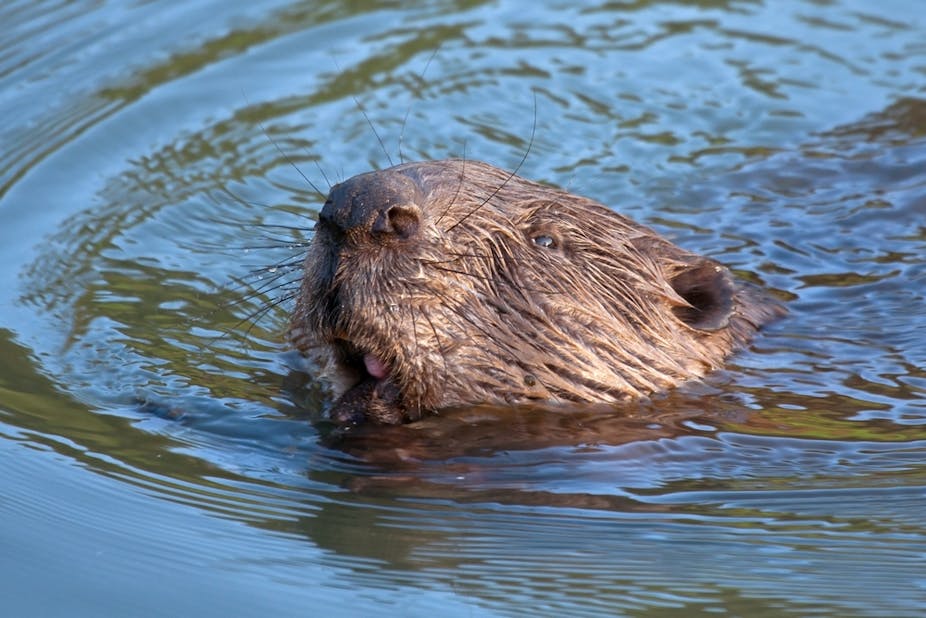Beavers have recently made a tentative return to Britain. Scotland has led the way, with an official trial population in Knapdale, a remote area of lochs and forest in the west of the country; and another in Tayside to the east, suspected to come from private-collection escapees and unlicensed releases. Further south, a small feral population in Devon in south-west England is currently being tolerated by officialdom and admired locally, while there are also plans for a trial in mid-Wales.
Should we let these beavers take up permanent residence? The Scottish government has first refusal. It is overdue to make a decision on the back of five years of scientific monitoring and other evidence. While conservationists wait with bated breath, we think there’s only one sensible choice – beavers should be allowed back.
The EU’s Habitats and Species Directive has been the cornerstone of conservation policy in Britain for the last 30 years. It actively encourages member states to consider reintroducing formerly native animals. The Eurasian beaver is a good candidate, having dwindled in mainland Europe to a handful of small isolated populations by the late 19th century. Thanks to the directive, it is now re-established across most of its former range, making Britain something of a laggard. The beaver became extinct here 400 years ago. In fact, Knapdale represents the first legal attempt to reintroduce an extinct native mammal to the country.
Beaver benefits
None of this is about nostalgia. Beavers are often referred to as “ecosystem engineers” and herein lies much of the reasoning and controversy behind their reintroduction. There is extensive evidence from Europe and North America that wetlands created by beaver dams benefit everything from water plants, dragonflies and amphibians to fish and ducks to song birds and bats. In Knapdale, damming by beavers transformed a small pond into a wetland of a type and complexity probably unseen in Britain for centuries.
Beavers can also restore habitats without the need for a bulldozer or planning permission. On the Bamff estate on Tayside, we found that grazing by beavers trebled the number of wetland plants over a nine-year period. Where raised water levels saturated a meadow thanks to damming of ditches, the number of plant species increased by 49% and the multitude of habitats created increased the total diversity of aquatic invertebrates by almost 30%. Indeed the benefits were even further reaching. We found that the beaver dams also acted as a sink for agricultural pollutants, and may also help to reduce the risk of flooding. Individually these findings are not that surprising, though it is unusual to demonstrate them all in parallel.

So it’s a no-brainer? While the Scottish public are broadly supportive of reintroducing these dog-sized, rather retiring herbivores, farmers, foresters and some anglers are less keen. Beavers get accused of damaging farm crops and commercial plantations through feeding, tree-felling, blocking streams, causing floods, undermining flood embankments and clogging up fish-spawning gravels.
These concerns are often legitimate and locally significant, and need to be addressed. Yet there are tried and tested ways of mitigating beaver impacts borrowed from the US and Germany that have already been trialled in Scotland, including live-trapping, electric fencing and so-called “beaver deceivers” for managing pond levels. At the same time, beavers have been wrongly held responsible for some high-profile flooding incidents and there remains a widely held but entirely mistaken belief among some anglers that they eat fish. In fact, the most recent analysis in Scotland suggests that beavers generally have a positive impact on the likes of trout.
The reality is that beavers, people and fish have co-existed for thousands of years. There is no reason why in principle this should not continue, even if beavers change the landscape and the landscape itself has changed in their absence. The successful reintroduction and effective management of beavers in central Europe testifies to their adaptability. Beavers bring multiple environmental benefits and the risk of local but manageable disruption shouldn’t eclipse these.
Bigger than beavers?

In some senses the “beaver question” is a metaphor for the much bigger question of what sort of environment we want in Britain in future. Beavers are potentially at the vanguard of a wider movement called rewilding – transforming landscapes through everything from less intensive farming to reintroducing keystone species. Saying yes to beavers doesn’t mean opening the floodgates to all supposedly desirable species from bison to lynx, but it recognises that we can cope with changing how we run our land, and that the alternatives might be better. On the other hand, saying no to beavers would shut the door on any bigger ambitions, perhaps for decades.
This is also not about going back to the Stone Age – indeed taking land out of production might require more intensive farming elsewhere to address concerns about food security. Instead of imposing rewilding, we must seek the cooperation of landowners. We might incentivise this with subsidies to recognise the ecosystem services that species like beavers provide, while compensating inconvenienced landowners. And as well as mitigating against the impacts that reintroduced creatures can cause, we’ll need to think more about the wider risk of further divorcing people from nature by creating wilderness areas.
But be all that as it may, the positives greatly outweigh the negatives. When it comes to conservation, we have lacked ambition for too long. Saying yes to reintroducing beavers is the sort of bold and forward-looking move that would resurrect the UK’s conservation credentials.

